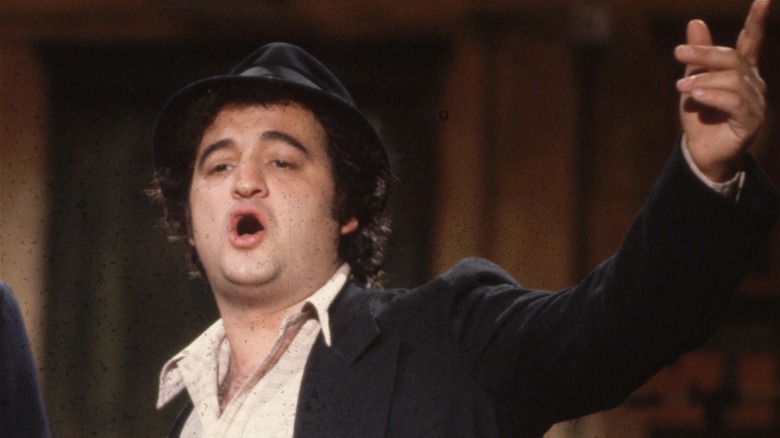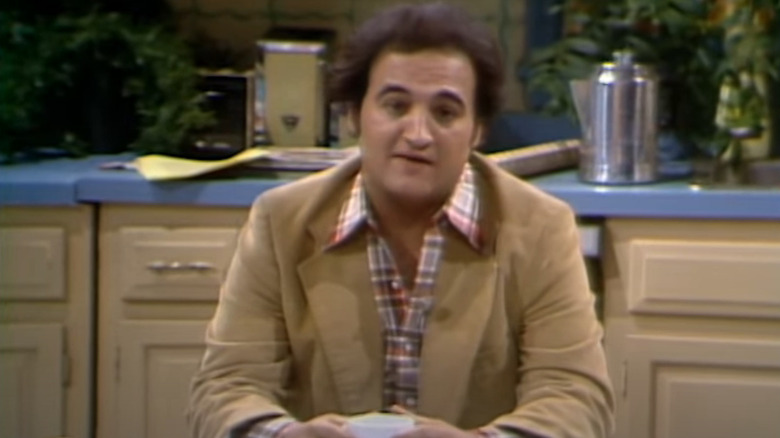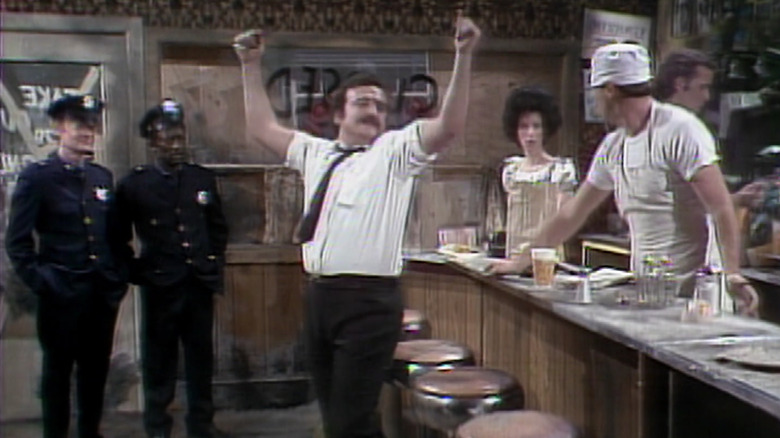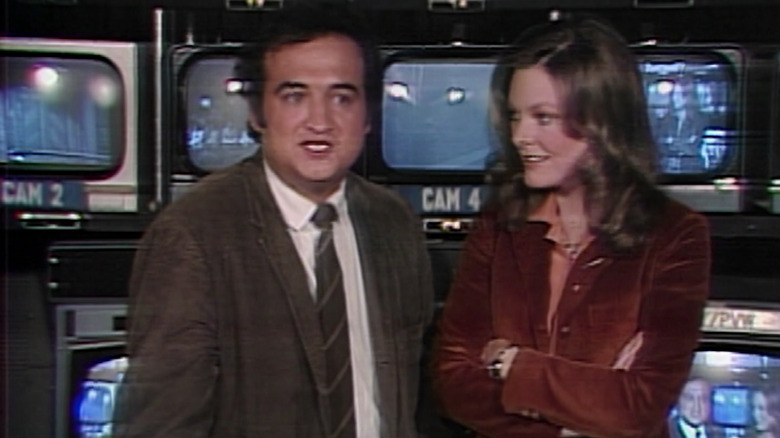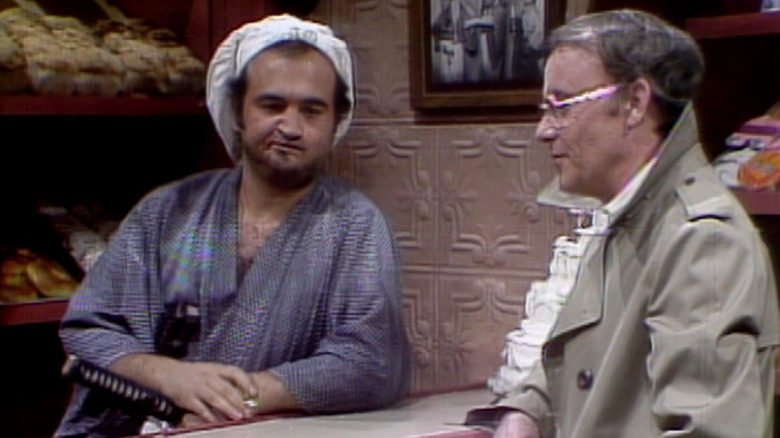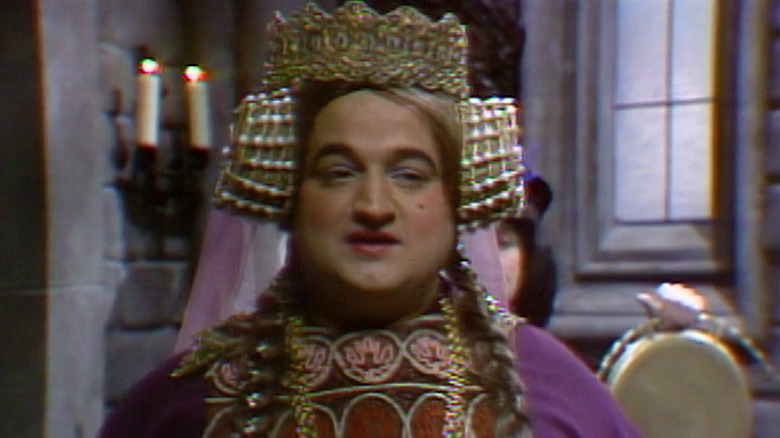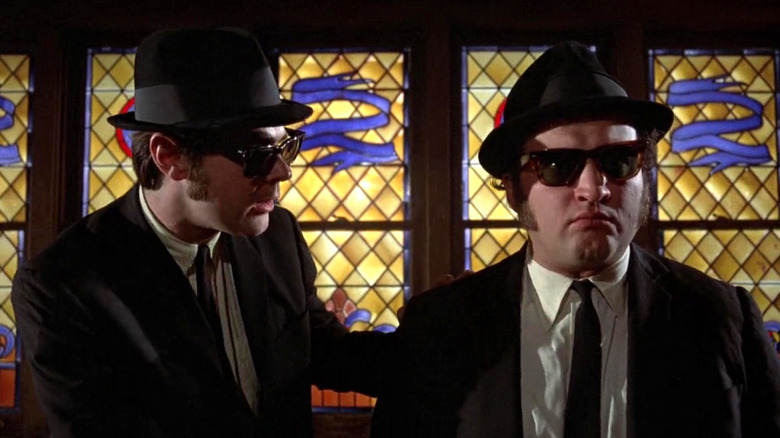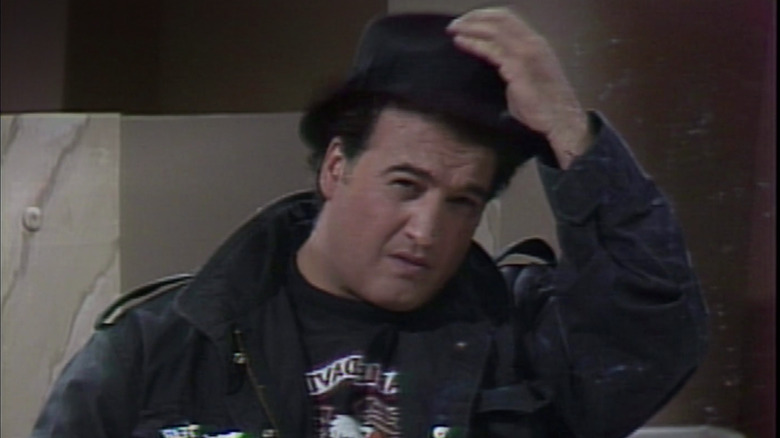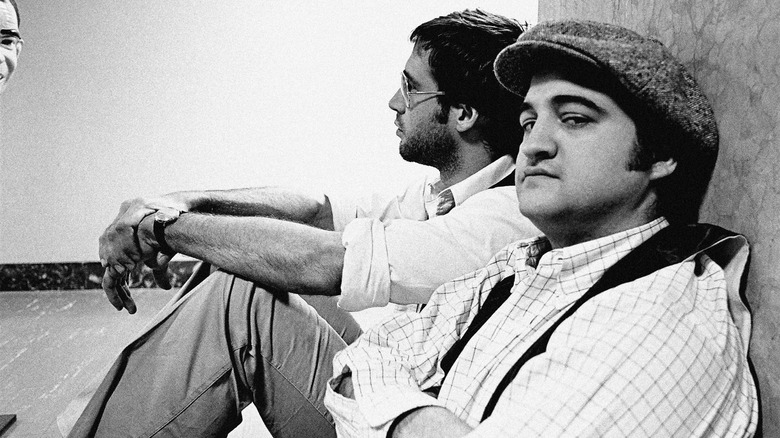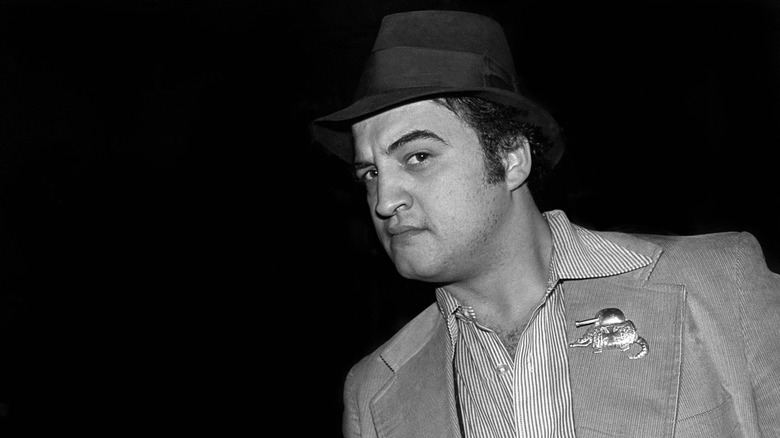What John Belushi's Final Appearance On SNL Was Really Like
In 1974, writer Lorne Michaels and NBC's vice president of late-night programming, Dick Ebersol, were tasked with filling the network's Saturday night time slot. Thus, "Saturday Night Live" (initially known as "NBC's Saturday Night") was born, a live sketch comedy variety show known for its rebellious approach. The talent was to consist of a large rotating cast, and for the show's debut, Michaels assembled an iconic team known as "The Not Ready For Prime-Time Players."
Meanwhile, a Chicago native born to Albanian immigrants, John Belushi, was making a name for himself in the comedy world, performing in The Second City and National Lampoon comedy groups. Known for his high energy and physicality, Michaels knew he would be a great addition to the show. Belushi quickly became a fan favorite with his standout characters Samurai Futaba, Ludwig van Beethoven, and Pete Dionisopoulos, among others. Soon, he got a taste of movie stardom with box office hits like "National Lampoon's Animal House" and "The Blues Brothers," the filming of which prompted Belushi and Dan Aykroyd to depart from "SNL."
Belushi was at the height of his career but struggled with keeping the momentum, relying on drugs to deal with the pressures of fame. On March 5, 1982, he died of an overdose at age 33. Unfortunately, his untimely death has often overshadowed his impressive career and legacy as one of the greatest cast members on "SNL," which is why it's only necessary we explore what Belushi's final appearance on the show was really like.
Firings and rehirings
As it turns out, Lorne Michaels' hesitation about John Belushi was warranted. Like most of the cast, he recklessly soaked up his newfound fame through drug use and long nights of partying. Due to their grueling work schedules and the overall attitude of 1970s social liberation, this type of lifestyle became normalized by the "Saturday Night Live" cast and crew, but what set Belushi apart from the rest was his inability to separate his work from his recreation. Speaking with Rolling Stone, Belushi described his behavior as self-destructive. His "Animal House" character, Bluto Blutarsky, only reinforced his status as a wild party animal. "I swear, you'd walk down the street with him, and people would hand him drugs. And then he'd do all of them — be the kind of character he played in sketches or 'Animal House,'" filmmaker and close friend Penny Marshall told The Hollywood Reporter.
When his escapades started affecting his work, Michaels had little patience and fired Belushi on more than one occasion. However, these firings never lasted long. "John, obviously, he could party with the best of them, but the next day, these guys were just so miserable," fellow cast mate Jane Curtin told People Magazine. In the documentary "Belushi" (via Page Six), Michaels recalls when the comedian showed up before a live taping in a disastrous state. When the doctor advised against John performing, Michaels asked what the odds of him dying were. According to the doctor, it was 50/50. Michaels responded, "I can live with that."
John Belushi's final episode as a regular
"Saturday Night Live" has been the launching pad to stardom for many comedians. Look no further than Eddie Murphy, Adam Sandler, and Amy Poehler. Although fame beyond "SNL" has become a well-trodden path for the most talented of cast members, those who were part of the show's inception had no idea what it could do for their careers. Still, John Belushi had big plans. Television was never his end-all-be-all, and with the success of "National Lampoon's Animal House," he was ready for movie stardom. Splitting his time between Los Angeles and New York City became too much to balance, causing him to lean more into drug use.
Eventually, he chose to leave the show to pursue a movie career with fellow cast member and creative partner Dan Aykroyd. Their first project was a comedy feature based on their musical sketch, "The Blues Brothers." The duo's final episode as regulars was the Season 4 finale, hosted by writer and actor Buck Henry with musical guest Bette Midler, airing on May 26, 1979. "Now I'll move on and make way for some other new talent to step in and make his own mark," said Belushi in a statement. It wasn't long after Belushi's departure that the show started going downhill, with many attributing his absence as a factor in its decline. Nevertheless, it wouldn't be the last time he made an appearance on the show.
Stealing the cold open spotlight
In John Belushi's final episode, he and Jane Curtin perform a sketch for the cold opening in which Curtin complains to the crew about never getting the chance to deliver the famous introduction, "Live from New York, it's Saturday night!" Belushi comes to her defense with some backhanded compliments before interrupting and opening the show himself. The sketch is lighthearted and fun, but what might be less known is how the sketch mirrored Belushi's treatment of women on the "Saturday Night Live" set. Appearing on "The Oprah Winfrey Show" years later, Curtin shared her experiences of being among the first women working on the show. "Their battles were constant. They were working against John, who said women are just fundamentally not funny," Curtin said, adding that Belushi would sabotage the work of women writers and comics.
However, it's meaningful to note Curtin understands Belushi's behavior was likely a result of his drug use. "I did have problems with John, but that was because John wasn't John. He was an addict," she told People Magazine. However, Belushi's wife, Judith Belushi Pisano, has come to his defense, calling him a "women's libber" during a Film Independent Q&A – although she noted things started to change because of the "boys club" atmosphere of "SNL." Chalk it up to addiction or bad influences, but the one thing that's for sure is that Belushi was a complex person who faced unique challenges during his short life.
Samurai Futaba's bakery
John Belushi has faced criticism for more than just his alleged misogynistic tendencies. Look no further than his famous Samurai Futaba character on "Saturday Night Live," a job-juggling samurai meant to parody actor Toshiro Mifune's samurai characters in films such as "Yojimbo." Through today's lens, it's an offensive caricature, but in the '70s, Belushi was scoring roaring laughs for his performance. He played the character one last time in his final episode in a sketch titled "Samurai Bakery." In the sketch, Buck Henry comes into the samurai's bakery to buy a last-minute wedding cake for his brother. The two exchange some words that elicit audience laughter, and Henry leaves with the perfect cake.
This isn't the first time Henry and Samurai Futaba cross paths. Throughout his frequent hosting gigs for "SNL" (10 times total), Henry and Belushi performed eight Samurai sketches together. The character was just as much Henry's as it was Belushi's. If it weren't for Henry's suggestion, the character would've never appeared again after the first sketch. "I did suggest repeating certain characters, which didn't seem to me exactly revolutionary," Henry said in a Vulture interview. "Why not do the samurai character in different situations over and over again? The repetition is funny in and of itself." Thus, audiences were blessed with "Samurai Tailor," "Samurai Stockbroker," "Samurai Psychiatrist," and so on, until the final bakery sketch.
100th episode cameo
On March 15, 1980, "Saturday Night Live" celebrated its 100th episode. It was one of the few episodes with no announced guest host, and in place of the opening monologue usually fulfilled by the host, Bill Murray performed a standup routine, including a song about New York. John Belushi also returned for the episode. Since his departure less than a year earlier, Belushi was hard at work with Dan Aykroyd filming "The Blues Brothers," which was scheduled for release in the summer of that year. Although it hadn't been too long since Belushi left the show, fans were eager to welcome him back with open arms.
Belushi appears in the opening sketch as a spirit of "SNL" past and delivers the iconic opening line. Later in the episode, he's featured as high-pitched royalty Elenour of Gaunt in "Minstrels of Newcastle," a sketch about a medieval band rehearsal. The sketch became famous for the show's first-ever F-word slip by featured cast member Paul Shaffer. Following this brief cameo, Belushi made only one more guest appearance before his death in 1982.
The Blues Brothers
The famous friendship between John Belushi and Dan Aykroyd predates "Saturday Night Live," with the two meeting backstage at Second City in 1973. "We took one look at each other. It was love at first sight," Aykroyd told Vanity Fair. When they joined the original cast of "SNL," that love grew into a partnership responsible for conceptualizing the blues and soul revival band The Blues Brothers. The original Blues Brothers consisted of Aykroyd as Elwood, the harmonica player and occasional vocalist, and Belushi as "Joliet" Jake, the charismatic lead vocalist. They also dressed the same, sporting matching black suits and skinny ties and accessorizing with sunglasses and porkpie hats. They workshoped the act around town and eventually took it to the "SNL" stage in Season 3 Episode 18, hosted by Steve Martin. They then signed a record deal with Atlantic Records, and their debut album, "Briefcase Full of Blues," went double platinum. The only way to up the ante was to make a feature-length film.
As stated before, this was the reason for Belushi and Aykroyd's departure from "SNL" — not that Belushi needed an excuse at that point. However, off schedule and over budget, "The Blues Brothers" production was a disaster, which didn't help Belushi's self-destructive behavior. "We had a budget in the movie for cocaine for night shoots," Aykroyd told Vanity Fair. With everything going wrong, paired with the film's outlandish concept, everyone believed it'd be a demonstrable failure. Yet, the film ultimately grossed $115.2 million at the worldwide box office, adding to the overwhelming pressure Belushi had been struggling with for years.
One last appearance on one condition
The following year, John Belushi returned for "Saturday Night Live's" Season 7 Halloween episode, hosted by Donald Pleasence. Of course, no one could have known at the time — least of all Belushi — that this would be his last appearance on the show before his untimely death in a few months. Belushi demanded one condition for his participation: "SNL" had to allow the punk rock band Fear to perform.
According to an article by Rolling Stone, Belushi became a fan of Fear after seeing their performance on "New Wave Theatre" in 1980. He reached out to lead vocalist Lee Ving and asked the band to write him a song for his upcoming movie "Neighbors." The song, accurately titled "Neighbors," never made it into the final cut and wasn't heard by the public until 2015, when Ving eventually released it.
Belushi made up for the song's omission by guaranteeing the band a spot on an "SNL" Halloween episode. However, no one was prepared for the performance Fear had in store. Surrounded by a group of real, slamdancing punks on stage, Fear performed the songs "Beef Baloney" and "New York's Alright" before being cut from the air and replaced with a prerecorded Eddie Murphy sketch. Why? The punk fans wreaked havoc on set, breaking equipment and yelling obscenities into the mic. Due to their actions, the band was permanently banned from the show. Although the performance was chaotic and dangerous, it was without a doubt memorable, and it was all thanks to Belushi and his eclectic taste in music.
John Belushi dies of a drug overdose in March 1982
In 1982, John Belushi was in Los Angeles trying to figure out his next career move. However, this proved to be more difficult than he anticipated due to his state of addiction. To put it lightly, Belushi was in the midst of a drug binge in March of that year. Shawn Levy, the author of "The Castle on Sunset: Life, Death, Love, Art and Scandal at Hollywood's Chateau Marmont," described him as: "a time bomb, a waste site, a mess. Sweaty, flabby, edgy, pale, disheveled, worn to a stump at 33."
Belushi went to his manager, Bernie Brillstein, for money, which he reluctantly handed over, not knowing the actor's fate. With the money, Belushi contacted drug dealer Cathy Smith and requested something stronger than his usual high doses of cocaine. Back at Belushi's bungalow at the Chateau Marmont, Smith repeatedly injected him throughout the night with cocaine mixed with heroin, otherwise known as a speedball.
By morning, Belushi was in poor condition but still alive when Smith left the bungalow. Belushi's physical trainer and occasional bodyguard, Bill Wallace, arrived later and found him unresponsive. When EMTs reached the scene, he was declared dead around noon on March 5, 1982. A few days later, it was announced he had died of combined drug intoxication from the speedballs. Years earlier, "Saturday Night Live" writer and Belushi's close friend Michael O'Donoghue predicted during a Rolling Stone interview: "The same violent urge that makes John great will also ultimately destroy him."
Paying tribute
To close out the first "Saturday Night Live" episode following John Belushi's death, cast member Brian Doyle-Murray delivered a personal and moving monologue in his memory. He recalled when Belushi saved his life from an oncoming truck, taking the hit instead and walking it off with no problem. "I always thought he was indestructible," he expressed. That seemed to be the commonly held perception of Belushi, which is why no one felt they could prevent his tragic demise. Ultimately, he was considered a victim of his success. Still, many close to him believe he would've met the same fate regardless of fame. "John always had an uneasiness in himself, and he was trying to fill it with something," his wife Judith Belushi Pisano told The Guardian.
Loved ones and fans remember Belushi as a comedic anarchist, paving his own path with an all-or-nothing attitude and sensitive, down-to-earth charm. Dan Aykroyd was in the middle of writing "Ghostbusters" when Belushi died; it would've been their next collaboration. "It was clear that his spirit was within Danny's script, and I respected that," the movie's director Ivan Reitman told The Guardian. Belushi's legacy lives on through the memories and creativity of those who cherished him.
If you or anyone you know needs help with addiction issues, help is available. Visit the Substance Abuse and Mental Health Services Administration website or contact SAMHSA's National Helpline at 1-800-662-HELP (4357).
